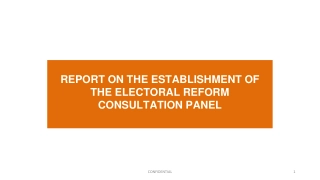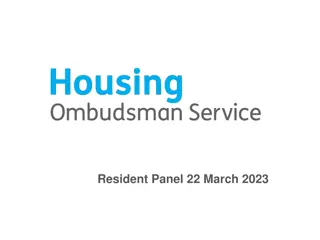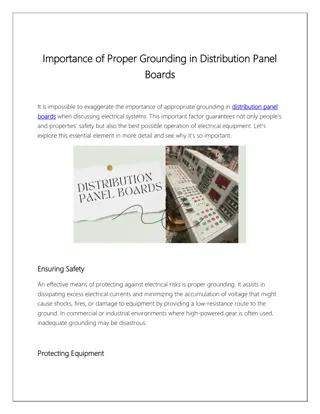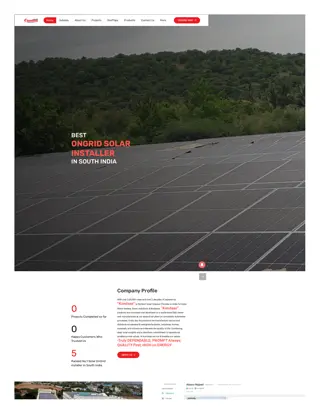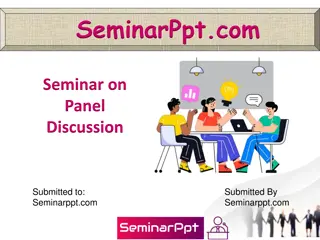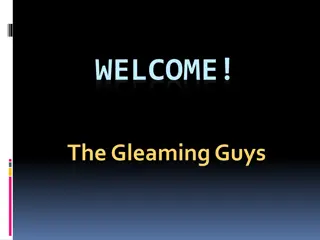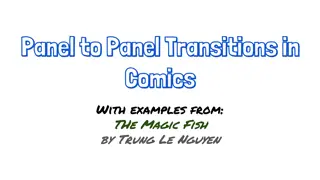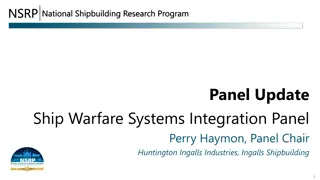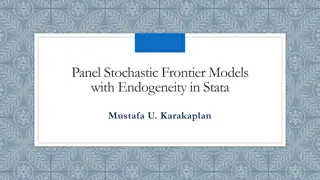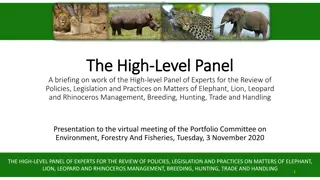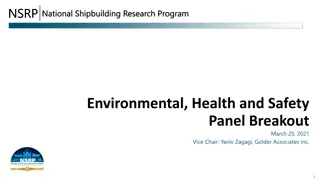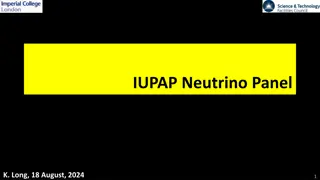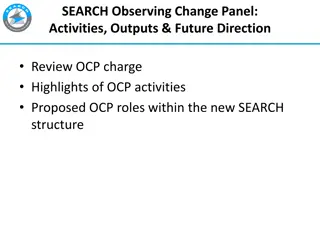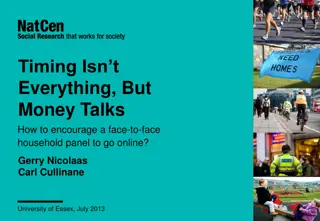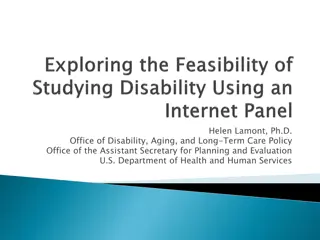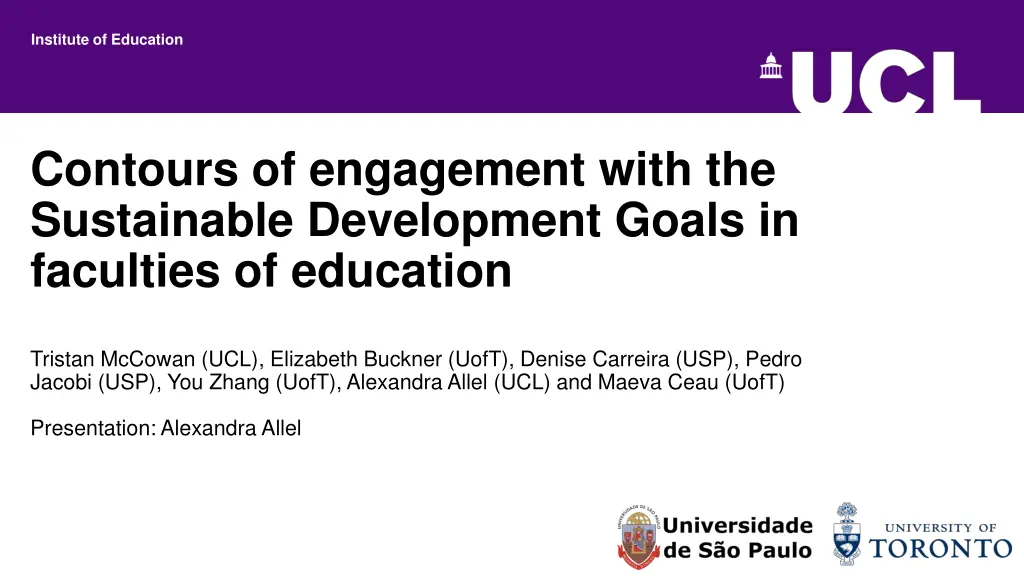
Engaging with Sustainable Development Goals in Faculties of Education
Explore how universities like UCL, UofT, and USP are integrating the Sustainable Development Goals (SDGs) into their faculties of education. Discover the challenges, strategies, and approaches through a holistic assessment, addressing gaps in the literature through documentary analysis, interviews, and focus groups.
Uploaded on | 3 Views
Download Presentation

Please find below an Image/Link to download the presentation.
The content on the website is provided AS IS for your information and personal use only. It may not be sold, licensed, or shared on other websites without obtaining consent from the author. If you encounter any issues during the download, it is possible that the publisher has removed the file from their server.
You are allowed to download the files provided on this website for personal or commercial use, subject to the condition that they are used lawfully. All files are the property of their respective owners.
The content on the website is provided AS IS for your information and personal use only. It may not be sold, licensed, or shared on other websites without obtaining consent from the author.
E N D
Presentation Transcript
Institute of Education Contours of engagement with the Sustainable Development Goals in faculties of education Tristan McCowan (UCL), Elizabeth Buckner (UofT), Denise Carreira (USP), Pedro Jacobi (USP), You Zhang (UofT), Alexandra Allel (UCL) and Maeva Ceau (UofT) Presentation: Alexandra Allel
Background In recent years, higher education institutions have increasingly engaged with the SDGs, integrating them into mission statements, sustainability initiatives, courses, research, community engagement, and campus operations (Ceulemans et al., 2015; Chankseliani & McCowan, 2021; Cortese, 2003; Hallinger & Chatpinyakoop, 2019; Wu & Shen, 2016). However, the integration of sustainability in faculties of education, remains inconsistent. While some teacher education programmes address sustainability, these efforts are often fragmented, with limited cross- disciplinary collaboration or alignment with broader institutional strategies.
Research focus and question The research project aimed to address this gap in the literature by providing a holistic assessment of the ways in which the SDGs manifest themselves in faculties of education. It poses the following main question: How are the faculties of education of University College London, the University of S o Paulo and the University of Toronto engaging with the Sustainable Development Goals?
Methods To further explore whether the Faculties of Education of University College of London, University of Toronto and University of S o Paulo are embedding the SDGs in their curriculum and practices, each research team is working on a documentary analysis to explore how each faculty is currently working with the SDGs, what strategies are being pursued and what challenges arise at institutional and faculty level. Data collection: Documentary analysis Staff and academics interviews Focus groups with students In IOE-UCL specifically, 9 interviews have been conducted with IOE academics and staff. In addition, 3 focus groups were made with 3- 5 students each, gathering views from undergraduate and postgraduate students. While there are some specificities to each context, the three research teams are using a common framework in their data collection process, to enable subsequent comparative analysis of the evidence collected. A similar process, with a similar sample, was conducted in University of Toronto.
IOE University College London: Top-down strategies? UCL is committed to addressing global challenges through education, research and innovation, aligning its work with its broader Sustainable UCL strategy, which responds directly to the challenging times that we face and to the unique societal position that universities have in relation to these challenges, aiming for UCL to take a leadership role and demonstrating that change is possible. Sustainable UCL is a strategy that drives sustainability through initiatives like Positive Climate, The Loop, and Wild Bloomsbury, focusing on carbon reduction, waste, and biodiversity. It integrates sustainability into education and aims for net-zero carbon by 2030, supported by the Climate Hub and ESD Steering Group. UCL s Grand Challenges is an interdisciplinary research initiative that brings together experts from different fields to address global issues, focusing on eight priority themes aligned with the SDGs. It aims to develop practical responses and maximise UCL's impact on global challenges. Grand Challenges themes: Mental Health & Wellbeing Climate Crisis Data-Empowered Societies Justice & Equality Cultural Understanding Transformative Technology
IOE University College London: Top-down strategies? SDGs Initiative focuses on maximising the impact of the SDGs through teaching, research, and partnerships, tracking progress via annual reports and promoting SDG-related activities across the university. Student-oriented initiatives: there are many other initiatives such as volunteering opportunities, the Student Sustainability Ambassadors Programme, an optional course for students to engage with sustainability contents, among others. As for IOE specifically, the faculty supports sustainability through research centres like the Centre for Climate Change and Sustainability Education and the Development Education Research Centre, focusing on climate, global learning, and sustainable development, though there s no formal link to the SDGs. Other SDGs-related initiatives at IOE: Two FutureLearn free courses to improve access to global education and education for sustainable development: Educating for Sustainable Development (ESD) in Schools and Universities and Global Education for Teachers A new BA programme called Youth, Society and Sustainable Futures" has been launched to start in September 2025.
OISE University of Toronto (UofT): Bottom-up strategies? The sustainability-related work of the Ontario Institute for Studies in Education (OISE) is embedded within the vision of the University of Toronto President s Advisory Committee on the Environment, Climate Change and Sustainability. However, OISE has developed most of its sustainability strategies and activities within the institute itself. Strategies: the OISE Climate Action Advisory Committee (CAAC) provides advice to OIESE s Dean to embed sustainability into the institute s teaching, research and advocacy. The OISE Sustainability and Climate Plan (SCAP) serves as a framework for the institute s activities. Other strategies include the OISE Library Sustainability Action Plan 2024-2026 and the Institute s IT services created and shared promising practices of technological advancement to shape wellness and improve environmental sustainability. Academics: A collaborative specialization in Environmental Studies is available and the Master of Teaching programme includes a mandatory Environmental and Sustainability Education module. A total of 20 modules on ESE, climate justice, and Land-based learning are offered at OISE. In addition, a Co-Curricular Record divided into 3 levels offers students the possibility to earn a sustainability certification.
OISE University of Toronto (UofT): Bottom-up strategies? Activities: The Sustainability & Climate Action Network (SCAN)coordinates most of the institute s activities for sustainability. Current initiatives include conferences and events, professional development in Environmental and Sustainability Education for OISE students and K-12 teachers, a community learning garden, community-engaged learning for sustainability, sustainability guides for faculty members, students and staff and a sustainability fund for Sustainability and Climate Plan (SCAP)- related projects. Research: A group of 9 faculty members explicitly conduct research on Sustainability, Climate Justice and Environmental and Sustainability Education. Other faculty members have been found to research EcoSchools and teacher leadership in ESE.
FEUSP University of So Paulo As for the Faculty of Education at the University of Sao Paulo, team members are in the process of data collection, so no further analysis can be shared today on this institution. However, it can be mentioned that USP, and specifically its faculty of education, has a focus on addressing the challenges posed by intensifying climate emergencies, environmental racism and inequalities. Also, considering the background of its territory, they highlight the importance of contributing to processes of mitigation, adaptation and ecological transition with climate justice that consider gender, race, income and other markers of inequality.
Relevant findings at UCL SDGs as a Guiding Framework: Most academics, staff, and students recognised the SDGs as a valuable global framework for addressing sustainable development and the interconnected challenges of our time. However, it was noted that they should be approached critically, as certain voices were marginalised in their formulation. For instance, one interviewee highlighted that, while the SDGs represent progress compared to the Millennium Development Goals, they still contain gaps in addressing diverse contexts and settings, raising concerns about their universal applicability. Academics' and Staff s Connection to the SDGs: The majority of academics and staff interviewed believed that their roles are directly linked to one or more SDGs. They saw their research and practice as active contributions towards tackling sustainability, as well as social and economic challenges. Link of the SDGs with Economic Development: Some interviewees pointed out a key limitation of the SDGs as a framework; they can be aligned with and used to justify economic development and growth as the primary means of addressing poverty. Consequently, this can legitimise certain ongoing practices that are highly destructive to the environment.
Relevant findings at UCL Need for Improved Collaboration Between Academics and IOE Staff: Collaboration between staff, teachers, and researchers at IOE should be strengthened, particularly in relation to these topics. Although IOE is a leading centre for teacher education, there is limited dialogue between researchers and teachers, and little opportunity for interdepartmental discussions. Raising Awareness of the SDGs: As a leading faculty of education, both academics and students recognise that IOE can contribute to achieving the SDGs by raising awareness. Additionally, students expressed a desire to learn more about the SDGs, not only from a critical theoretical perspective but also in terms of practical and transformative actions they can take. Student Participation in SDG Initiatives: While most students are aware of the various sustainability-related initiatives taking place at UCL and IOE, many do not participate due to a lack of interest. This highlights a gap in actively engaging students who are currently disengaged, thereby enhancing both awareness and participation in these initiatives.
References Ceulemans, K., Haider, Z., & Jorna, R. (2015) 'Sustainability in higher education: A literature review', Journal of Cleaner Production, 106, pp. 49-58. https://doi.org/10.1016/j.jclepro.2015.04.095. https://doi.org/10.1016/j.jclepro.2015.04.095 Chankseliani, M. & McCowan, T. (2021) 'Higher education and sustainable development goals: Understanding the linkages', Sustainability, 13(14), pp. 1-17. https://doi.org/10.3390/su13147273. Cortese, A.D. (2003) 'The critical role of higher education in creating a sustainable future', Planning for Higher Education, 31(3), pp. 15-22. Hallinger, P. & Chatpinyakoop, P. (2019) 'Leading educational change: The role of school leadership in implementing educational reforms in Thailand', Educational Management Administration & Leadership, 47(3), pp. 445-466. https://doi.org/10.1177/1741143217751474. Sustainable UCL (2019). Change possible: the strategy for a sustainable UCL 2019-2024. [online] Available at: https://www.ucl.ac.uk/sustainable/sites/sustainable/files/change_possible._the_strategy_for_a_sustainable_ucl_2019-2024.pdf [Accessed 20 Sep. 2024]. UCL (2021). New online global education course opens for teachers. [online] Available at: https://www.ucl.ac.uk/ioe/news/2021/mar/new-online-global-education-course-opens-teachers [Accessed 05 Nov. 2024]. UCL (2022). UCL Strategic Plan 2022-27. [online] Available at: https://www.ucl.ac.uk/strategic-plan-2022-27 [Accessed 20 Sep. 2024]. UCL (2023a). UCL Retains 1st Class People and Planet Award. [online] Available at: https://www.ucl.ac.uk/sustainable/news/2023/dec/ucl-retains-1st-class-people-and-planet-award [Accessed 09 Oct. 2024]. UCL (2024a). UCL SDGs Report 2022-23. [online] Sustainable Development Goals. Available at: https://www.ucl.ac.uk/sustainable-development-goals/about-ucl-sdg-initiative/ucl-sdgs-report-2022-23 [Accessed 23 Sep. 2024]. UCL (2024b). UCL retains top global ranking for education and architecture & built environment. [online] Sustainable Development Goals. Available at: https://www.ucl.ac.uk/news/2024/apr/ucl-retains-top-global- ranking-education-and-architecture-built-environment [Accessed 09 Oct. 2024]. UCL (2024c). Educating for Sustainable Development in Schools and Universities. [online] Available at: https://www.ucl.ac.uk/short-courses/search-courses/educating-sustainable-development-schools-and- universities [Accessed 05 Nov. 2024]. UCL (no date a). What UCL does. [online] About UCL. Available at: https://www.ucl.ac.uk/about/what [Accessed 20 Sep. 2024]. UCL (no date b). Grand Challenges. [online] Available at: https://www.ucl.ac.uk/grand-challenges/about-us [Accessed 20 Sep. 2024]. UCL (no date c). UCL Grand Challenges & the SDGs. [online] Available at: https://www.ucl.ac.uk/grand-challenges/impacts-and-outputs/ucl-grand-challenges-sdgs [Accessed 20 Sep. 2024]. UCL (no date d). How UCL is supporting the UN Sustainable Development Goals (SDGs). [online] Available at: https://www.ucl.ac.uk/sustainable-development-goals [Accessed 20 Sep. 2024]. UCL (no date e). About the UCL SDGs Initiative. [online] Available at: https://www.ucl.ac.uk/sustainable-development-goals/about-ucl-sdgs-initiative [Accessed 23 Sep. 2024]. UCL (no date f). UCL Climate Hub: a community for change. [online] Available at: https://www.ucl.ac.uk/climate-change [Accessed 23 Sep. 2024]. UCL (no date g). Generation One. [online] Available at: https://www.ucl.ac.uk/climate-change/generation-one [Accessed 23 Sep. 2024]. UCL (no date h). Generation One: The Climate Podcast. [online] Available at: https://www.ucl.ac.uk/climate-change/podcasts-videos/generation-one-climate-podcast [Accessed 23 Sep. 2024]. UCL (no date i). Meet our senior team. [online] Available at: https://www.ucl.ac.uk/ioe/about ioe/meet our senior team [Accessed 23 Sep. 2024].

